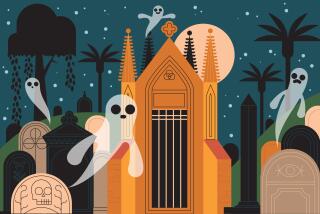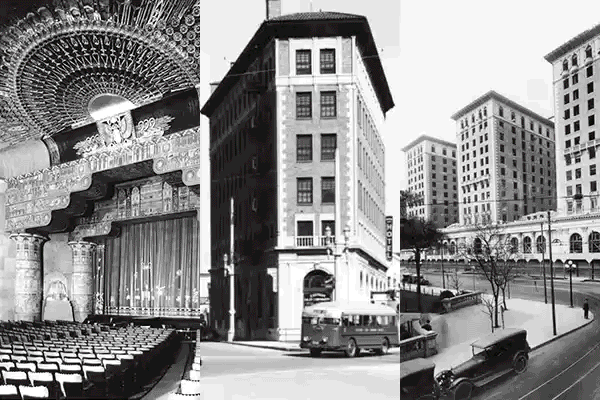‘Chinatown’ screening reminds us of L.A.’s dark side
- Share via
Everyone hated Los Angeles in the 1970s. If you didn’t, you were ashamed to admit it. When my friend and I came home from college in Berkeley to do what we saw as cool, noirish things — drive by the house where the Manson family murdered somebody, or sneak into Houdini’s deserted mansion — we kept it quiet so we wouldn’t be labeled “plastic.”
I was reminded of this when “Chinatown”screened at the Hollywood Forever cemetery this summer. Three hours before the film started, hundreds of college and post-college kids toting sleeping bags and wicker hampers crammed onto the roped-off lawn in front of the cemetery gate to see Roman Polanski’s 1974 L.A. noir epic.
These young, laughing people, in their vintage polyester dresses, Abba T-shirts and fedoras, could have Netflixed “Chinatown” and a dozen other movies for $8 a month. Or they could have downloaded the film from one of the file-sharing sites they have bookmarked.
Instead, 4,000 of them paid $10 each to sprawl on the cold, dewy ground and watch the film projected against the marble mausoleum where Rudolph Valentino and Peter Lorre are buried.
In an especially macabre touch, John Huston, who played Noah Cross, Chinatown’s Mephistophelean mogul, was with us both in spirit and in body. The late actor and director is buried near the cemetery lake, John Wyatt, the founder of Cinespia, which puts on the cemetery film series, announced to appreciative murmurings from the crowd.
The other coast still hates us for the same, tired reasons they trotted out 30 years ago: our crassness, inauthenticity and lack of culture. But Los Angeles right now is in love with itself. Embarrassed no more, we love being out and about in L.A.. doing L.A. things with L.A. people. At outdoor concert series, art walks and farmers markets, L.A. struts around looking at itself and thinks, yes.
When Cinespia started its outdoor screenings 11 years ago, it was virtually alone. Now, there are alfresco screenings from Woodland Hills to Pasadena. Even my local coffeehouse has shown movies on the patio.
“People really feel the hunger to be together on a bunch of blankets, meet strangers and mix with the hoi polloi,” said Wyatt. “It’s part of this renaissance we’re having, this interest in L.A.’s cultural makeup.”
One of the film series’ organizers was surprised by the huge turnout for “Chinatown,” but he shouldn’t have been. The saga of bad cops, water rights, development and incest in high places depicts the L.A. that L.A. lovers love to love: dark, depraved, disillusioned.
“Chinatown’s” exquisite use of 1970s L.A. spots — Point Fermin, the L.A. River — to depict the L.A. of the 1930s was further framed by the historic graveyard setting. Behind the mausoleum a row of palm trees was silhouetted against the twilight sky.
Beyond that were the streets of Hollywood — not the new Hollywood of the W hotel and sorority girl bars but the tawdry, leaking-couch-on-the-porch Hollywood with its broken sidewalks and late-night doughnut shops.
Polanski’s bio added yet another noir shading to the viewing. When he made “Chinatown,” he was only five years removed from the Manson followers’ murder of his wife, Sharon Tate. He went on to flee sentencing in Los Angeles for having unlawful sex with a 13-year-old girl, and faces arrest if he returns to the U.S.
I imagine many young viewers watched the film’s stars, Jack Nicholson and Faye Dunaway, through several filters. Nicholson, who played jaded detective Jake Gittes, is the guy with courtside tickets who thinks he knows as much about basketball as the Lakers. Dunaway, who portrayed Evelyn Mulwray, the tragic victim of the film, has been a reality show judge.
Real life periodically intruded on the celluloid. A police helicopter’s searchlight strafed the ground nearby, tracing a circle of possible murder and mayhem in the Hollywood flats. But it seemed somehow symbolic: the days of soaring homicides and violence in the neighborhood are largely over.
“Middle of a drought, and the water commissioner drowns. Only in L.A.,” the coroner told Jake, to knowing laughter from the crowd.
People passed by like wraiths in the night, leaping over the Mexican blankets and Trader Joe’s bags only to discover they couldn’t find their way back to their friends. “Where are you?” urgent whispers sounded in the darkness. Someone pulled out a cake with candles, and we all sang “Happy Birthday.”
A police bullet finally pierced Evelyn’s eye, and Gittes’ partner uttered the signature line, “Forget it, Jake. It’s Chinatown.” The crowd whooped and whistled as if Prince had just tuned up “Purple Rain.”
It was lots of fun. But as we walked out, I wondered if Los Angeles, in its self-regard, might be getting too tame, even precious. Chinatown today has a gallery row and a summer series that will bring gourmet food trucks and an Iron Chef-style cook-off to the streets where Jake was vanquished by absolute evil.
On the other hand, Chinatown will also soon haveWal-Mart, which landed its permits a day before the City Council voted to keep it out. The discount retailer’s PR firm was fired after one of its employees was caught impersonating a reporter at an anti-Wal-Mart news conference.
L.A. is always going to have its dark and sleazy side. Nostalgia can’t keep up.
Gale Holland is writing columns about the dark corners of our 24-hour metropolis and welcomes suggestions.
More to Read
Sign up for Essential California
The most important California stories and recommendations in your inbox every morning.
You may occasionally receive promotional content from the Los Angeles Times.













